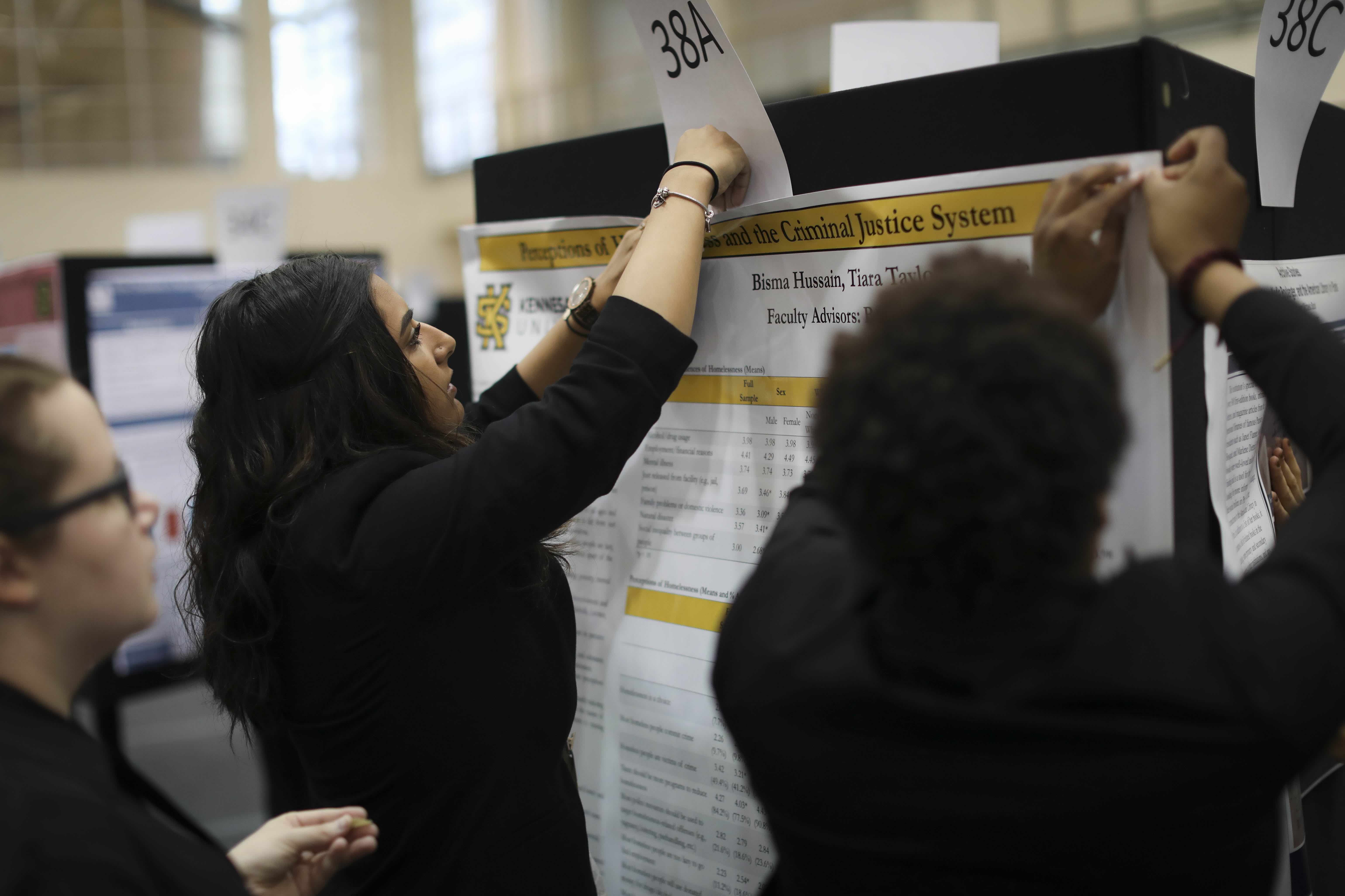Undergraduate Research Course Redesign Institute
 Course-based Undergraduate Research Experiences, or CUREs, involve students in a class
engaging in original research projects that have the potential to be disseminated
beyond the course (for example, an exhibition, a performance, a conference presentation,
a publication). Research shows that CUREs are effective in many different disciplines and for students at all levels, including the first year. As one scholar notes, "Undergraduate demand for research positions far exceeds supply;" CUREs can help
provide a solution to this problem.
Course-based Undergraduate Research Experiences, or CUREs, involve students in a class
engaging in original research projects that have the potential to be disseminated
beyond the course (for example, an exhibition, a performance, a conference presentation,
a publication). Research shows that CUREs are effective in many different disciplines and for students at all levels, including the first year. As one scholar notes, "Undergraduate demand for research positions far exceeds supply;" CUREs can help
provide a solution to this problem.
Undergraduate research is a high-impact practice for students, and KSU is committed to supporting students in research through the "It's About Engagement" initiative.
The purpose of this Course Redesign Institute is to help faculty design or redesign courses so that they are aligned with the definitions and guidelines for the "It's About Engagement" initiative. Faculty in this Institute will participate in an intensive, week-long experience where they will learn about designing CUREs. Time will be provided for participants to create or re-create a syllabus for a course they are planning to teach over the next year. Faculty accepted to this Institute will be paid a stipend of $1,500 upon completion of the requirements.
Please Note: The Institute is not being offered in 2024
Below are some Frequently Asked Questions (FAQs) about the Undergraduate Research Course Redesign Institute. If you have any other questions, please contact our@kennesaw.edu.
-
What topics will be covered in this Institute?
At the end of this Institute, participants will be able to:
- Describe best practices in course design and apply those practices to a course they will teach over the next year.
- Describe the "It's About Engagement" initiative at KSU.
- Summarize the literature on CUREs (Course-based Undergraduate Research Experiences), including benefits and best practices in structuring them.
- Create a syllabus for a course they will teach over the next year that incorporates an undergraduate research experience that can be disseminated outside of the class.
- Develop an assignment for reflection on the undergraduate research experience, consistent with guidelines for the "It's About Engagement" initiative.
On the final day, participants share their newly (re)designed artifacts. These artifacts may include a syllabus, course activities, assessments, and/or rubrics.
-
When is the next offering?
The Institute is not being offered in 2024.
-
What is the stipend amount for participating in this institute?
Each accepted faculty member will receive $1,500 for their participation in this Institute as long as the requirements are met
-
Who is eligible to participate in this Institute?
All full-time faculty, part-time faculty, and lecturers who are under contract to teach during the semester the course will be delivered are eligible to apply.
-
How do I apply?
Applications are not being accepted at this time.
-
What are the requirements for faculty who are accepted into the Undergraduate Research Course Redesign Institute?
In order to receive the stipend, faculty who are accepted into this Institute must do the following:
- Attend the Institute (4.5 days) in its entirety. It is not acceptable to miss any of the Institute and still receive the stipend. In other words, do not teach a course during the Institute, do not make other appointments, do not schedule other meetings, etc. If you cannot avoid time conflicts during the Institute, you should apply for the Institute in a different year where you can fully attend.
- Produce a revised syllabus with an undergraduate research experience for a course to be taught the following Summer, Fall, or Spring. The projects in the course should be able to be disseminated (e.g., presentation, publication, performance, exhibition) outside of the class.
- Show evidence of scaffolding (Shanahan et al., 2015) for the undergraduate research project in the course.
- Produce guidelines for a reflection assignment in the course.
(Note: Time will be allotted in the Institute for participants to work on their syllabus and assignments)
Reference
Shanahan, J. O., Ackley-Holbrook, E., Hall, E., Stewart, K., & Walkington, H. (2015). Ten salient practices of undergraduate research mentors: A review of the literature. Mentoring & Tutoring: Partnership in Learning, 23, 359–376.
-
When will I hear if my application has been accepted?
All applicants will be notified of the decision within two weeks of the deadline.
-
Can a Directed Study count as a course to be redesigned in this Institute?
Yes; any for-credit course can be used for this course redesign institute. The courses can be introductory, intermediate, Directed Studies, capstones, etc.
-
Does the course I am designing or redesigning have to be face-to-face or can it be online or hybrid?
The Institute is open to all faculty who teach in all delivery modalities (online, blended, face-to-face).
-
I am already teaching a course with an undergraduate research component. Can I still apply for this Institute?
Yes! We encourage all faculty who are interested in course-based undergraduate research experiences (CUREs) to apply for this Institute. This includes faculty who have never done this before as well as faculty who are already doing this but would like more information about improving the experience for their students.











